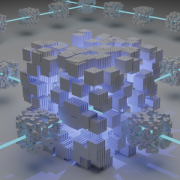Organizing is the foundation of the human enterprise. The common denominator of building pyramids, flying to space, dealing with wildfires, and running hotels is the need for a well-oiled organization that gets the work done through the coordinated action of people entrusted with parts thereof. Almost every product and service we use requires a joint effort of many orchestrated through a management mechanism that determines how to carry out work effectively.
Recently, we have witnessed a new form of organization that develops and maintains digital services characterized by actors’ self-selection into roles and tasks and grassroots-driven decision making. These organizations call into question well-established notions of organization and work.
Participation in these organizations is voluntary, comparable to the dynamics we observe in open source software development communities like Linux. Typically, actors coordinate with a changing set of collaborators who can freely enter and exit the organization. Instead of formal organization structures and legal grounds to induce, enforce, and motivate cooperation, participants rely on crypto tokens to govern operational activities and strategic decisions.
Thus, participating actors are token holders that have a stake in the success of the organization (“skin in the game”). In lieu of managers relying on command and control, the management mechanism of these organizations relies on tokens to provide members with remunerations for their contributions and the ability to vote on key decisions. Being financially involved in achieving organizational goals incents token holders to participate in voting sessions on resource allocation, equity sharing, and proposals for new features or initiatives for the organization.
These token-driven organizations are often framed in the context of decentralized finance (DeFi) services and decentralized platforms. The International Monetary Fund estimated the cryptocurrency industry to exceed a collective market capitalization of US $2.5 trillion in 2021, while the DeFi sector retained assets valued at more than $78 billion in February 2022, marking a 10x growth multiple in the span of 12 months.
Overall, blockchain technology has enabled new organizational forms that rely on token-driven management and coordination mechanisms challenging traditional forms of organizing. In the past few years, we have witnessed a growing number of decentralized communities and Web3 projects that push the boundaries of possibility and fuel the imagination of a better world through technological and social innovation.
A decentralized autonomous organization (DAO) is a new form of organization that aims to orchestrate work and appropriation of shared capital independently of central control to attain espoused objectives through self-executing rules encoded in crypto tokens. Web3 is envisioned as a corrective action for Web 2.0, in which big platforms monetize user-generated content. Web3 aspires to give content creators and users a way to monetize their activity and contributions using crypto tokens.
A recent issue of Amplify explored the trends, innovations, technologies, applications, opportunities, challenges, and novel research reshaping token-driven organizations. Understanding how digital tokens govern work and organizing in virtual organizations can unravel important questions for leaders and managers of traditional organizations.
For example, how can digital tokens make decision making more democratic and inclusive? How can Web3 challenge or change existing business models? How should responsibility and accountability be interpreted in token-driven organizations? How can a flat organization become digitally enabled and token-driven? Which regulatory pitfalls should decentralized, digitally enabled organizations be aware of? How can start-up founders adopt flat organizational structures to incent their employees and encourage innovative business models?
DAOs have the potential to disrupt industries and shake up traditional organizational governance mechanisms. However, the possibility of fatal pitfalls in developing a DAO is as significant as the likelihood that the DAO will have a disruptive economic and social impact.




